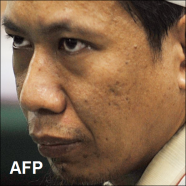Overview
Aman Abdurrahman—also known as Oman Rochman—is a U.S.-designated terrorist and the “de-facto” leader of ISIS supporters in Indonesia, according to the U.S. Department of the Treasury.Martin Chulov and Paul Farrell, “Revealed: the new face of Neil Prakash, Australia’s most wanted Isis member,” Guardian (London), December 2, 2016, https://www.theguardian.com/world/2016/dec/03/neil-prakash-new-images-isis-member-arrest-turkey-australia. He is serving a nine-year prison sentence for a 2010 terrorism conviction.“Treasury designates Australian and Southeast Asian ISIL Operatives and Leaders,” U.S. Department of the Treasury, January 10, 2017, https://www.treasury.gov/press-center/press-releases/Pages/jl0698.aspx. In May 2016, he was handed new charges for helping to plot—from prison—the January 2016 ISIS-linked terrorist attack in Jakarta that killed four people and injured 25 others.Wahyudi Soeriaatmadja and Francis Chan, “Indonesia to charge radical ideologue Aman Abdurrahman for planning Jakarta attack,” Straits Times, May 9, 2016, http://www.straitstimes.com/asia/se-asia/indonesia-to-charge-radical-ideologue-aman-abdurrahman-for-planning-jakarta-attack. In June 2018, Abdurrahman was found guilty and sentenced to death for inciting multiple acts of terrorism in the country while he was in prison.Muktita Suhartono and Richard C. Paddock, “Indonesia Sentences ISIS Recruiter to Death,” New York Times, June 22, 2018, https://www.nytimes.com/2018/06/22/world/asia/indonesia-isis-aman-abdurrahman.html.
As a teenager, Abdurrahman attended Islamic boarding schools and then studied at the Islamic and Arabic College of Indonesia in Jakarta (LIPIA), a branch of the Imam Muhammad ibn Saud Islamic University in Riyadh, Saudi Arabia.Randy Fabi and Kanupriya Kapoor, “Jail to jihad: Indonesian prisons a breeding ground for militancy,” Reuters, January 19, 2016, http://in.reuters.com/article/indonesia-blast-prisons-idINKCN0UW28S. After receiving his Bachelor’s degree at LIPIA, Abdurrahman began his career as a lecturer at the university and other academic institutions, but was dismissed in early 2000 for adopting a radical interpretation of Islam.Rendi A. Witular, “The rise of Aman Abdurrahman, IS master ideologue,” Jakarta Post, January 25, 2016, http://www.thejakartapost.com/news/2016/01/25/the-rise-aman-abdurrahman-is-master-ideologue.html.
In 2004, an Indonesian court sentenced Abdurrahman to seven years in prison for bomb-making and terror activities.Rendi A. Witular, “The rise of Aman Abdurrahman, IS master ideologue,” Jakarta Post, January 25, 2016, http://www.thejakartapost.com/news/2016/01/25/the-rise-aman-abdurrahman-is-master-ideologue.html;
Andrew Silke, Prisons, Terrorism and Extremism: Critical Issues in Management, Radicalisation and Reform (New York: Routledge, 2014), 216, https://books.google.com/books?id=-wbnAgAAQBAJ&dq=abdurrahman+sentenced+to+seven+years+in+prison&source=gbs_navlinks_s. In prison he met Abu Bakar Bashir, a U.S.-designated terrorist and the founder of the Indonesian terror group Jemaah Islamiyah.Rendi A. Witular, “The rise of Aman Abdurrahman, IS master ideologue,” Jakarta Post, January 25, 2016, http://www.thejakartapost.com/news/2016/01/25/the-rise-aman-abdurrahman-is-master-ideologue.html. Abdurrahman was released in 2008 for good behavior, and in 2010, collaborated with Bashir—who was released in 2005—to form a jihadist training camp in Aceh, western Indonesia. Abdurrahman was arrested for his activities later that year and sentenced to nine years in prison. Bashir is serving a 15-year sentence for the crime.Lee Hudson Teslik, “Profile: Abu Bakr Bashir (a.k.a. Ba’asyir),” Council on Foreign Relations, June, 14 1006, http://www.cfr.org/indonesia/profile-abu-bakar-bashir-k-baasyir/p10219;
Rendi A. Witular, “The rise of Aman Abdurrahman, IS master ideologue,” Jakarta Post, January 25, 2016, http://www.thejakartapost.com/news/2016/01/25/the-rise-aman-abdurrahman-is-master-ideologue.html.
While in prison in early 2014, Abdurrahman pledged allegiance to ISIS online. According to the U.S. Department of Treasury, in August 2014 he began translating ISIS propaganda into Indonesian, and distributing translations to Islamic studies groups within the prison and on social media.Randy Fabi and Kanupriya Kapoor, “Jail to jihad: Indonesian prisons a breeding ground for militancy,” Reuters, January 19, 2016, http://in.reuters.com/article/indonesia-blast-prisons-idINKCN0UW28S;
U.S. Department of the Treasury, “Treasury designates Australian and Southeast Asian ISIL Operatives and Leaders,” January 10, 2017, https://www.treasury.gov/press-center/press-releases/Pages/jl0698.aspx. In October of that year, according to the U.S. Department of the Treasury, the still-detained Abdurrahman became Indonesia’s main translator for ISIS and began spreading ISIS propaganda on the internet, which included a call for Muslims to kill Westerners.“Treasury designates Australian and Southeast Asian ISIL Operatives and Leaders,” U.S. Department of the Treasury, January 10, 2017, https://www.treasury.gov/press-center/press-releases/Pages/jl0698.aspx. In 2015, nearly two dozen Indonesian terrorist factions unified behind Abdurrahman to support ISIS. He named his newfound organization Jamaah Ansharut Daulah (JAD).Rendi A. Witular, “The rise of Aman Abdurrahman, IS master ideologue,” Jakarta Post, January 25, 2016, http://www.thejakartapost.com/news/2016/01/25/the-rise-aman-abdurrahman-is-master-ideologue.html;
“State Department Terrorist Designation of Jamaah Ansharut Aulah,” U.S. Department of State, January 10, 2017, https://www.state.gov/r/pa/prs/ps/2017/01/266763.htm.
Abdurrahman has reportedly radicalized at least 20 of his fellow prisoners, several of whom have gone on to engage in terrorist activities following their release, according to security experts. One of these former prisoners was Sunakim, a.k.a. Afif, one of five men who carried out the ISIS-linked gun and suicide bomb attack in Jakarta in January 2016 that killed four.Randy Fabi and Kanupriya Kapoor, “Jail to jihad: Indonesian prisons a breeding ground for militancy,” Reuters, January 19, 2016, http://in.reuters.com/article/indonesia-blast-prisons-idINKCN0UW28S. Aburrahman has also recruited Indonesians to ISIS’s ranks in Syria, and reportedly requires Indonesians to receive his approval before traveling to ISIS-controlled territory. As of January 2017, the U.S. Department of Treasury has documented two cases in which Abdurrahman recruited individuals to join ISIS abroad.“Treasury designates Australian and Southeast Asian ISIL Operatives and Leaders,” U.S. Department of the Treasury, January 10, 2017, https://www.treasury.gov/press-center/press-releases/Pages/jl0698.aspx.
Despite incarceration, Abdurrahman has released his extremist sermons via email, Facebook, and in hard copy.Randy Fabi and Kanupriya Kapoor, “Jail to jihad: Indonesian prisons a breeding ground for militancy,” Reuters, January 19, 2016, http://in.reuters.com/article/indonesia-blast-prisons-idINKCN0UW28S. According to researchers at the Brookings Institution, Abdurrahman’s supporters, both in and out of prison, consider his publications to be key sources of jihadist discourse.Noor Huda Ismail and Susan Sim, “Predicting terrorist recidivism in Indonesia’s prisons,” Brookings Institution, January 28, 2016, https://www.brookings.edu/opinions/predicting-terrorist-recidivism-in-indonesias-prisons/. Following the January 2016 gun and suicide bomb attack in Jakarta, prison officials moved Abdurrahman and other convicted terrorists into high security cells.“After Jakarta attacks, convicted terrorists to be isolated on Indonesia prison island,” Straits Times, February 12, 2016, http://www.straitstimes.com/asia/se-asia/after-jakarta-attacks-convicted-terrorists-to-be-isolated-on-indonesia-prison-island. Abdurrahman is not allowed physical contact nor can he receive packages from visitors.Wahyudi Soeriaatmadja, “Jakarta isolates five radical ideologues on prison island,” Asia One, February 21, 2016, http://news.asiaone.com/news/asia/jakarta-isolates-five-radical-ideologues-prison-island. In May 2018, 156 inmates staged a revolt at a detention center, which houses terrorist inmates including ISIS supporters and Abdurrahman. Abdurrahman had been transferred to the center before the start of his trial on new charges of inciting terrorist attacks, including the January 2016 attack. The inmates demanded to see Abdurrahman, which police said they allowed.Ben Otto and Anita Rachman, “Deadly Standoff Ends in Indonesia as Police Storm Terorrist Detention Center,” Wall Street Journal, May 10, 2018, https://www.wsj.com/articles/deadly-standoff-ends-in-indonesia-as-police-storm-terrorist-detention-center-1525932346.
The U.S. Department of the Treasury designated Abdurrahman alongside Bachrumsyah Mennor Usman, an Indonesian citizen and Syrian-based ISIS operative who had previously trained under Abdurrahman in Indonesia.“Treasury Designates Australian and Southeast Asian ISIL Operatives,” U.S Department of the Treasury, January 10, 2017, https://www.treasury.gov/press-center/press-releases/Pages/jl0698.aspx. Abdurrahman was also designated alongside Australian ISIS propagandist Khaled Sharrouf and Australian ISIS recruiter Neil Prakash, who has used social media platforms, including Twitter, to encourage Australians to join the terror group.Martin Chulov and Paul Farrell, “Revealed: the new face of Neil Prakash, Australia’s most wanted Isis member,” Guardian (London), December 2, 2016, https://www.theguardian.com/world/2016/dec/03/neil-prakash-new-images-isis-member-arrest-turkey-australia.
On June 22, 2018, Abdurrahman was found guilty and sentenced to death for inciting others to commit at least five terror attacks while still in prison.Muktita Suhartono and Richard C. Paddock, “Indonesia Sentences ISIS Recruiter to Death,” New York Times, June 22, 2018, https://www.nytimes.com/2018/06/22/world/asia/indonesia-isis-aman-abdurrahman.html. The attacks included the 2016 Jakarta attack, a church-bombing in East Kalimantan, and a series of bombings in east Jakarta.“Pro-ISIS Indonesian cleric Aman Abdurrahman won’t appeal against death sentence,” Straits Times, June 29, 2018, https://www.straitstimes.com/asia/se-asia/pro-isis-indonesian-cleric-aman-abdurrahman-wont-appeal-death-sentence. Police also suspect that he was an inspiration behind suicide church bombings in Surabaya as well as the revolt at a high-security detention center in May 2018.Muktita Suhartono and Richard C. Paddock, “Indonesia Sentences ISIS Recruiter to Death,” New York Times, June 22, 2018, https://www.nytimes.com/2018/06/22/world/asia/indonesia-isis-aman-abdurrahman.html. Abdurrahman reportedly instructed his lawyer not to file an appeal against his death sentence. He is reportedly being held at the National Police Mobile Brigade headquarters in Depok, West Java, and will be transferred to an unspecified high-security prison.“Pro-ISIS Indonesian cleric Aman Abdurrahman won’t appeal against death sentence,” Straits Times, June 29, 2018, https://www.straitstimes.com/asia/se-asia/pro-isis-indonesian-cleric-aman-abdurrahman-wont-appeal-death-sentence.
Associated Groups
- Extremist entity
- ISIS
- Read Threat Report
- Type(s) of Organization:
- Insurgent, territory-controlling, religious, terrorist, violent
- Ideologies and Affiliations:
- Islamist, jihadist, pan-Islamist, Salafist, takfiri
- Position(s):
- De-facto leader of ISIS supporters in Indonesia
ISIS is a violent jihadist group based in Iraq and Syria. The group has declared wilayas (provinces) in Egypt, Libya, Algeria, Yemen, Saudi Arabia, Nigeria, Afghanistan, Pakistan, and the North Caucasus. ISIS has also waged attacks in Turkey, Lebanon, France, Belgium, Iraq, Bangladesh, Indonesia, Malaysia, Tunisia, and Kuwait.
History
United States

The U.S. Department of Treasury designated “Oman Rochman” as a Specially Designated Global Terrorist (SDGT) pursuant to Executive Order 13224 on January 10, 2017.“Treasury designates Australian and Southeast Asian ISIL Operatives and Leaders,” U.S. Department of the Treasury, January 10, 2017, https://www.treasury.gov/press-center/press-releases/Pages/jl0698.aspx.
